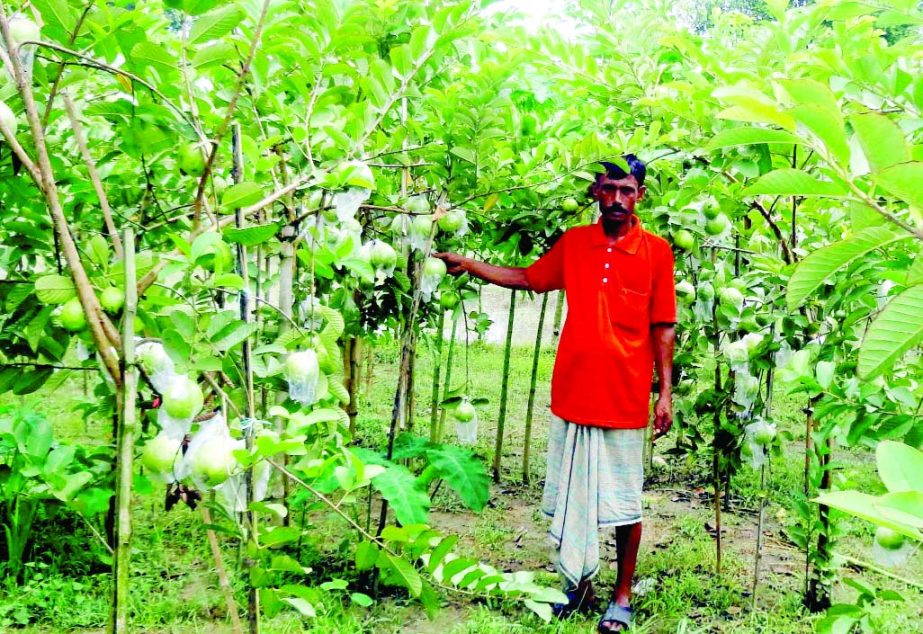
M.A. Awal, Narsingdi :
Cultivation of Kazi Peyara (Guava) has gained immense popularity among the farmers of the district as an important sources of income generation leading to economic self-reliance.
A number of marginal farmers mainly the reddish high lands of Shibpur, Belabo, Raipura and polash Upazilas of the district have been able to change their fate in the last few years by cultivation Kazi Peyara.
Department of Agriculture Extension (DAE) officials sources said, Kazi Peyara variety cultivation has become popular in the district since 2000. Many people specially the unemployed educated youth getting training on agriculture involved themselves farming Kazi peyara in the high fellow land where water does not stay. Recently they have also farming Kazi Peyara in their homestead garden due to its economic aspect.
Sapling of Kazi Peyara need a little spaces to grow up. Two Kazi Peyara sapling need minimun 10 to 12 feet space to grow fast. After plantation the sapling the tree bloom within two or three years.
Deputy Director of DAE Narsingdi Latafat Hossain told The New Nation that Kazi peyara generally growing on high fallow land specially the homestead garden. There is an scope for more cultivation of this variety of peyara in the district. Soil properties and climatic condition of these areas are suitable for cultivating kazi peyara, some 250 to 300 sapling can be planted on per bigha of land which is produces an average of 300 to 4 maunds of Kazi peyara per year. The fruit has more nutrition properties then that of common fruits.
Agriculture Extension (DaE) office sources said price of this popular fruit remains unusually high in the local wholesale market. Presently, a maund of guave is being sold at Tk 2000 to tk 2500 in dif ferent markets of the district.
Cultivation of Kazi Peyara (Guava) has gained immense popularity among the farmers of the district as an important sources of income generation leading to economic self-reliance.
A number of marginal farmers mainly the reddish high lands of Shibpur, Belabo, Raipura and polash Upazilas of the district have been able to change their fate in the last few years by cultivation Kazi Peyara.
Department of Agriculture Extension (DAE) officials sources said, Kazi Peyara variety cultivation has become popular in the district since 2000. Many people specially the unemployed educated youth getting training on agriculture involved themselves farming Kazi peyara in the high fellow land where water does not stay. Recently they have also farming Kazi Peyara in their homestead garden due to its economic aspect.
Sapling of Kazi Peyara need a little spaces to grow up. Two Kazi Peyara sapling need minimun 10 to 12 feet space to grow fast. After plantation the sapling the tree bloom within two or three years.
Deputy Director of DAE Narsingdi Latafat Hossain told The New Nation that Kazi peyara generally growing on high fallow land specially the homestead garden. There is an scope for more cultivation of this variety of peyara in the district. Soil properties and climatic condition of these areas are suitable for cultivating kazi peyara, some 250 to 300 sapling can be planted on per bigha of land which is produces an average of 300 to 4 maunds of Kazi peyara per year. The fruit has more nutrition properties then that of common fruits.
Agriculture Extension (DaE) office sources said price of this popular fruit remains unusually high in the local wholesale market. Presently, a maund of guave is being sold at Tk 2000 to tk 2500 in dif ferent markets of the district.

